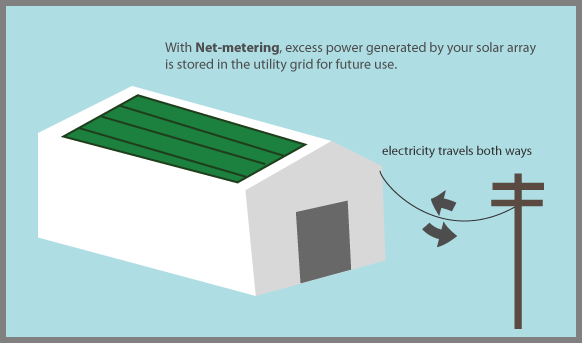Net metering in Massachusetts allows residential solar system owners to receive credit for the excess electricity their solar panels generate and feed back into the grid.
When an on-site renewable energy generator is producing more electricity than can be consumed by the on-site end-user, the surplus electricity flows into the electric grid. When the end-user consumes more electricity than is being generated, the electricity that was put into the grid is then returned to the end-user. If a surplus remains at the end of the month, a credit will be issued in the end-user’s electric bill.
Here’s how it typically works:
- Generating Electricity: When the solar panels produce more electricity than the household needs, the excess is sent back to the grid.
- Credit System: The excess electricity is credited to the homeowner’s electricity bill at the full retail rate. This means that for every kilowatt-hour (kWh) of excess electricity generated, the homeowner receives a credit equivalent to what they would have paid for that kWh if they had consumed it from the grid.
- Offsetting Electricity Costs: These credits can then be used to offset the cost of electricity drawn from the grid when the solar panels are not producing enough electricity to meet the household’s demand, such as during the night or on cloudy days.
- Savings and Benefits: Net metering allows homeowners to save on their electricity bills by effectively “banking” the excess electricity they generate. It also promotes the adoption of renewable energy by providing financial incentives for homeowners to invest in solar power systems.
It’s worth noting that net metering policies can vary by state and utility company.
Common Terms
- Net Metering
Rules that essentially allow an electric meter to spin backwards allowing surplus electricity to enter the grid.
- On-site Renewable Energy Generator
A behind-the-meter renewable energy generating facility, such as solar photovoltaic (solar) system, that produces power intended for on-site use in a home, office building, or other commercial facility.
- On-site End-user
An electricity consumer who has a renewable energy generating facility at its location (behind the meter).


